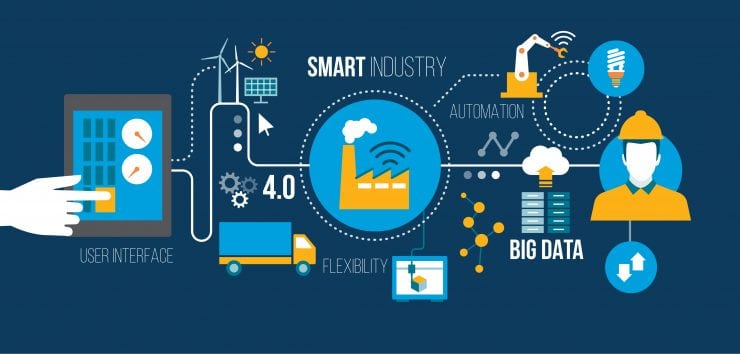Much of the early hype building up additive manufacturing is centered around the ability to create scalable factories built for the future of global business. While some of these benefits may be true today, industry 4.0 and additive manufacturing, when combined, can help enable the creation of products that are first-to-market, fully customized, and dynamic. These possibilities have the ability to change manufacturing in profound ways. Our analysis of the resulting technology trends motivates a framework that captures the activities for additive manufacturing’s move into mass manufacturing. This is the first part in a series of blogs on the additive manufacturing, or 3D printing, perspective on industry 4.0.
Industry 4.0 working group in Germany, a leader in research, development, as well as communication of smart manufacturing and innovation concepts has defined Industry 4.0 as a fourth industrial revolution that “will involve the technical integration of cyber-physical systems into manufacturing and logistics and the use of Internet-of-Things and digital services in industrial processes. This will have implications for the value creation, business models, downstream services and work organization.” This definition apprehends the broad areas of change taking place within supply chain systems and manufacturing industries worldwide. And while Industry 4.0 continues to evolve, there are still key themes in all the concepts which are crucial to comprehending. The team at Stratasys Strategic Consulting would like to share with users what has been learned thus far, and what they believe industry 4.0 means for additive manufacturing.
Digitization and Cyber-Physical Factory Systems
So now, what does the term cyber-physical mean as it is referenced here? Essentially, it comes down to a concept that looks at the advancement of modern manufacturing facilities and production processes, such as lean manufacturing, quality assurance and CNC fabrication, and addresses the face that most of the machines performing these processes still behave in reference to a bygone era of industrial production. Instructions can then be programmed into a machine and will follow them to the letter, Even if this means that the human who’s programming the machinery may make an error within that program. This is where the “cyber” address human-centric error mitigation, like fatigue, boredom, low-strength, missed accuracy, forgetfulness and illness, the business, and the factory floor staff, gains the ability to cope with the unexpected, catch mistakes and generally see the bigger picture. The falling and programmable logic controllers have unlocked this capability, alongside with a large amount of data. This data can be captured and improved upon over time. Everything on the factory floor, including all stock, inventory levels, temperatures within the factory or throughput per hour can now be tracked and analyzed.
We Have the Building Blocks Required to Construct Smart Factories
Industry 4.0 is more than manufacturing. It often represents a cultural shift in the way society does business, design, manufacturing, and interacting with one another as humans. Early industrial revolutions took humans and evolved them into machines. Mass manufacturing and commerce forced people to do mindless repetitive jobs, a single assembly operation on a production line, or endless data entry.
Industry 4.0 concepts can give machines that small piece of intuition they lack thus enabling machines to do mindless and repetitive jobs, but still have the programmed oversight to cope with the unexpected. People are now beginning to have the freedom to work the way people work best, both strategically and creatively. Although a cultural shift is required to encourage humans to become more flexible so we can handle the transition of economies of the future. Furthermore, the software tools used to carry out our work will require evolving to support using these new jobs that will need a different set of peoples-skills in different ways.
